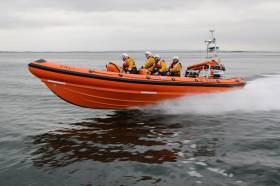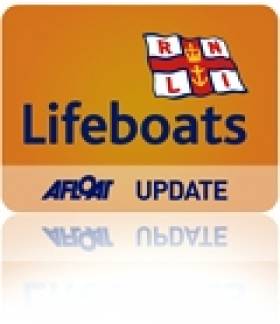Displaying items by tag: Hare Island
Galway Lifeboat Rescues Walker Stranded by Tide on Hare Island
Galway RNLI’s volunteer crew were requested to launch by the Irish Coast Guard on Monday afternoon (22 April) to rescue a walker on Hare Island who was cut off by the incoming tide.
The request to launch came shortly before 2pm and volunteer crew Dave Badger, James Rattigan, David Oliver and Olivia Byrne launched the inshore lifeboat and were on the water around 10 minutes later headed to Hare Island, on inner Galway Bay, which is accessible to walkers at low tide.
Conditions at sea were good with good visibility thanks to the current spell of fine weather.
When the crew reached Hare Island, they located the casualty who was safe and well. The crew brought the casualty on board the lifeboat and returned to the lifeboat station at the New Docks.
Lifeboat helm Dave Badger said: “It was a good outcome today. The casualty didn't require any further medical treatment once we returned to the lifeboat station.
“The casualty raised the alarm when they realised that they were cut off by the tide and were unable to get off the island, and that was the right thing to do. If you get into difficulty or see someone in difficulty, please dial 999 or 112 and ask for the coastguard.”
Badger added: “Walking around coasts is a very safe activity most of the time. Our advice is to always take a means of calling for help and to check the weather and tides. Tide times and heights vary throughout the month and can easily catch you out if you haven’t checked them.”
#RNLI - Three young German visitors were rescued by Galway RNLI after getting stranded on Hare Island in Galway Bay yesterday afternoon (Thursday 26 July).
The three students were trapped on the island after the tide came in shortly before 12.30pm.
A passer-by on the shore spotted the group and dialled 999 for assistance. Galway RNLI’s lifeboat was subsequently called to the scene and arrived within 10 minutes.
The students were completely surrounded by water when the lifeboat arrived to assist them on board. They were then taken to Galway Docks in the city, where they are staying. They did not require medical assistance.
The lifeboat crew on this callout were helm Sean King, Cathal Bryne, Greg Cullen and Olivia Byrne, who said: “This highlights the dangers of going out to Hare Island when the tide is coming in.
“These young men got completely cut off in a short space of time. Luckily a diligent observer on the shore came to their assistance and contacted the emergency services straight away.”
Strandings are not an uncommon occurrence at the tidal island, with similar incidents in 2010, 2013, 2016 and last September.
Stranded Students Rescued From Island By Galway RNLI
#RNLI - Galway RNLI came to the rescue of three students who got stranded on Hare Island yesterday afternoon (Monday 13 May) after getting caught in the tide off Ballyloughane Beach.
The two young women and young man, in their late teens/early 20s, had gone for a walk and were spotted waving from the island by a local resident who contacted the emergency services and Galway RNLI.
Conditions at the time (around 4pm) were changeable with heavy showers.
Three volunteer members of the inshore lifeboat crew were working in the vicinity of the station at the time and launched the boat in six minutes.
The three students were picked up safely and brought back to the lifeboat station at Galway Docks where they were warmed up and given tea. They did not require medical attention.
The lifeboat crew on this callout were helm David Oliver, Dara Oliver, David Badger and Olivia Byrne.
Lifeboat shore crew John Bryne said: "The three students did the right thing waiting on the island and not attempting to get off."
It's not the first time that people have been stranded by the incoming tide on Hare Island, as Galway RNLI were called to a similar incident in September 2010.































































